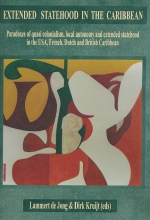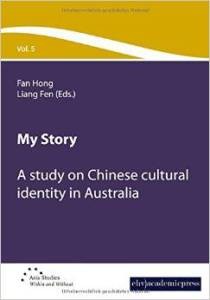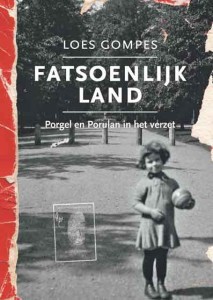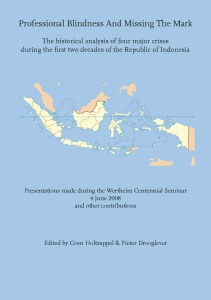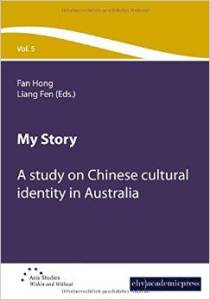 The book My Story ~ A Study On Chinese Cultural Identity In Australia, edited by Fan Hong and Liang Fen has been launched during an international event in Perth, Australia. The book had been published as volume 5 of the series Asia Studies – Within and Without – a book series that is kindly supported also by Rozenberg Quarterly.
The book My Story ~ A Study On Chinese Cultural Identity In Australia, edited by Fan Hong and Liang Fen has been launched during an international event in Perth, Australia. The book had been published as volume 5 of the series Asia Studies – Within and Without – a book series that is kindly supported also by Rozenberg Quarterly.
Contents:
Preface (See below)
Feng Jicai – A Creative Research Project
Dennis Haskell – Foreword
Jan Ryan – Foreword ~ Chinese in Australia, 1980 –
The first story: Sometimes, Flowers Bloom Even More Beautifully In A Foreign Soil
2: The Country Behind The Forests
3: Many Small Stones Can Build A Pyramid – That Is How Miracles Are Created
4: I Remain A Typical Chinese Person
5: Three Words, One Marriage
6. From “Falling Leaves Settling On The Roots” To “Falling Leaves Growing From The Roots”
7. I Will Repay My Motherland For Nurturing Me
8. From Chinese Country Boy To An Australian Professor
9. Who Is The Foreigner In This Place?
10. A Party With One Member
11. Start From Simplicity
12. An Ordinary Road
13. While Travelling Life’s Journey, Cherish Every Step And Every Stop Along The Way
14. Seeking A Better Life, Doing Meaningful Things
15. Never Say “Give up”
16. A Love Story
17. A Unique Personal Statement
18. Full Circle
19. We Are The Masters Of Our Destiny
20. A Special Representative
21. Reborn ~ New Family, New Vision And New Career
22. Only By Creating Your Own World Can You Create A Real Life
23. For All Walks Of Life, There Must Be A Master
24. The Older I Get, The More I Enjoy My Life
25. Half Australian And Half Chinese
26. Keep Your Nose To The Grindstone, You Will Be Successful In The End
Acknowledgement
Preface
The first wave of immigration from China to Australia appeared in the mid-19th century provoked largely by the gold rush of that period. In the 1861 census of Australia’s population there were over 38,000 Chinese migrants in Australia and by 1947 it had fallen to 6,400.
Since the 1980s there has been a new wave of Chinese immigration to Australia, and there are now over 415,000 Chinese immigrants, or ‘Chinese Australians’. Chinese migrants record high levels of educational attainment that match and occasionally surpass the national average. With a high degree of academic achievement and upward socioeconomic mobility, those Chinese Australians who were born post the 1950s and post 1980s are among the most well educated groups in Australia and comprise a large percentage of Australia’s educated class.
This research project is a part of the Cultural Identity Research led by the Confucius Institute at the University of Western Australia which focuses on the Chinese who have migrated to Australia since China opened up to the world in the 1980s. In this book we will tell the stories of these ordinary Chinese, their happiness and sorrows, inspirations and difficulties, and through recorded oral histories we will analyse their cultural identity, and their experience of integration with, and contribution to, this vast far away land.
Most of our interviewees, even if they have been living in Australia for many years, struggle to convey their cultural identity. This project is a precursor to further research on this fascinating universal issue for immigrants.
The project will capture the stories of 100 Chinese in Australia, with experiences reflecting all walks of life including blue collar workers, businessmen, entrepreneurs, politicians, doctors, lawyers, professors, students and housewives. The research team will record, transcribe, and review each interview, and reproduce each individual story, subsequently combining them in a series of books to be published – entitled “My Story – A study on Chinese cultural identity in Australia.”
This is Volume 1 of My Story it contains 26 stories of 30 people’s experiences in Australia. We start from when they first arrive in this foreign land, with their dreams and expectations. They recall their early and simple lives, enabling us to share their hardships, and celebrate their achievements and their pride in their contribution to both countries: Australia and China.
From the beginning of this project, we have received strong support from many Australian Chinese friends within the Chinese community. We acknowledge our gratitude to all the interviewees who offered their precious time, for their willingness to talk openly about their personal lives and to share their experiences, and for their recommending friends and acquaintances to participate in our project as part of our ‘snowball sample’. Some interviewees requested that they remain anonymous hence we have concealed the real names for all but one of the all interviewees but all the stories are true and authentic. We hope that their experiences as they continue the journey forward.
We would like to thank Mr Feng Jicai, Professor Jan Ryan, Professor Dennis Haskell, Dr Wang Yi and Mr Lin Gongjin for their guidance and consistent support.
We also thank Mr John C. Reeves, Professor Ian Henry, Dr Chen Hong and Mr Yu Chenggong for the English proofreading of this book; and Mr Wang Liyong and Miss Wang Zhengyu for the Chinese proofreading. We thank the three PhD candidates, Guang Zhixun, Liu Li and Zhang Huijie, for their wonderful editorial assistance. We thank the volunteers of the Confucius Institute of UWA for transcribing tapes, including Hu Siyu, Zhao Wei, Zhou Yu, Zhang Xiangwei, Hou Jingyu and Jiang Mingxue.
Finally, we thank all the teachers at the Confucius Institute of UWA for their professional expertise and commitment in turning the interviews into compelling stories. The fact that this first volume has been produced in less than a year is testimony to the hard work and continuous effort of the team at the Confucius Institute.
We hope you enjoy their stories and welcome all comments in what we hope will be a stimulating intercultural dialogue.
Order the book: http://www.amazon.de/My-Story-cultural-Identity-Australia
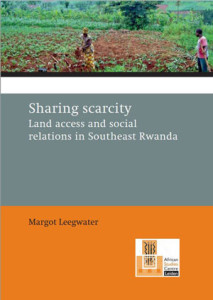 Land is a crucial yet scarce resource in Rwanda, where about 90% of the population is engaged in subsistence farming, and access to land is increasingly becoming a source of conflict. This study examines the effects of land-access and land-tenure policies on local community relations, including ethnicity, and land conflicts in post-conflict rural Rwanda. Social relations have been characterized by (ethnic) tensions, mistrust, grief and frustration since the end of the 1990-1994 civil war and the 1994 genocide. Focusing on southeastern Rwanda, the study describes the negative consequences on social and inter-ethnic relations of a land-sharing agreement that was imposed on Tutsi returnees and the Hutu population in 1996-1997 and the villagization policy that was introduced at the same time. More recent land reforms, such as land registration and crop specialization, appear to have negatively affected land tenure and food security and have aggravated land conflicts. In addition, programmes and policies that the population have to comply with are leading to widespread poverty among peasants and aggravating communal tensions. Violence has historically often been linked to land, and the current growing resentment and fear surrounding these land-related policies and the ever-increasing land conflicts could jeopardize Rwanda’s recovery and stability.
Land is a crucial yet scarce resource in Rwanda, where about 90% of the population is engaged in subsistence farming, and access to land is increasingly becoming a source of conflict. This study examines the effects of land-access and land-tenure policies on local community relations, including ethnicity, and land conflicts in post-conflict rural Rwanda. Social relations have been characterized by (ethnic) tensions, mistrust, grief and frustration since the end of the 1990-1994 civil war and the 1994 genocide. Focusing on southeastern Rwanda, the study describes the negative consequences on social and inter-ethnic relations of a land-sharing agreement that was imposed on Tutsi returnees and the Hutu population in 1996-1997 and the villagization policy that was introduced at the same time. More recent land reforms, such as land registration and crop specialization, appear to have negatively affected land tenure and food security and have aggravated land conflicts. In addition, programmes and policies that the population have to comply with are leading to widespread poverty among peasants and aggravating communal tensions. Violence has historically often been linked to land, and the current growing resentment and fear surrounding these land-related policies and the ever-increasing land conflicts could jeopardize Rwanda’s recovery and stability.